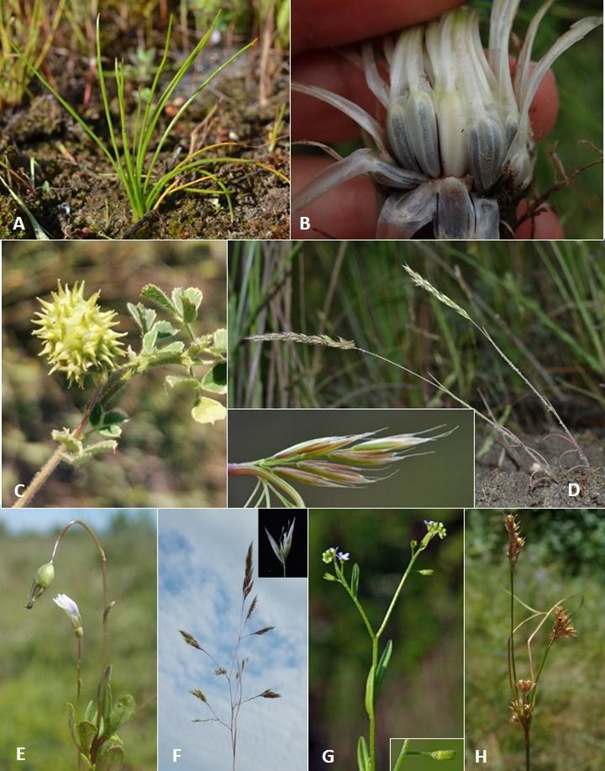On the distribution and conservation status of some Mediterranean species new for the flora of Montenegro
DOI:
https://doi.org/10.3986/hacq-2025-0004Keywords:
alien species, conservation, IUCN assessment, new recordsAbstract
Investigations of dune habitats in Montenegro led to the discovery of 8 species and infraspecies taxa new for the country: Avellinia festucoides (Link) Valdés & H. Scholz, Corynephorus divaricatus (Pourr.) Breistr., Isoetes histrix Bor., Juncus tenuis Willd., Medicago doliata Carmign., Myosotis laxa Lehm. ssp. cespitosa (Schultz) Hyl. ex Nordh., Setaria parviflora (Poir.) Kerguélen, and Solenopsis laurentia ssp. gasparrinii (Tineo) Brullo. Of particular importance are Solenopsis laurentia ssp. gasparrinii and Isoetes histrix, the first of which has not yet been recorded in the southeastern part of the Adriatic, while the second is doubtfully reported for Albania. Since only one or a potentially small number of additional localities are expected in Montenegro, the following species are proposed as candidates for the national list of legally protected species: Isoetes histrix, Solenopsis laurentia ssp. gasparrinii, Avellinia festucoides and Corynephorus divaricatus. According to the IUCN criteria, the Isoetes histrix, Solenopsis laurentia ssp. gasparrinii and Corynephorus divaricatus are assessed as CR, while Avellinia festucoides as EN. Monitoring and eradication measures are proposed for alien species (Setaria parviflora and Juncus tenuis), especially for the second one, which is considered invasive in some countries.
Downloads
References
Arianoutsou, M., Bazos. I., Christopoulou, A., Kokkoris, Y., Zikos, A., Zervou, S., Delipetrou, P., Cardoso, A. C., Deriu, I., Gervasini, E., & Tsiamis, K. (2021). Alien plants of Europe: introduction pathways, gateways and time trends. PeerJ., 9, Article e11270. https://doi.org/10.7717/peerj.11270
Bachman, S., Moat, J., Hill, A. W., de la Torre, J., & Scott, B. (2011). Supporting Red List threat assessments with GeoCAT: geospatial conservation assessment tool. ZooKeys, 150, 117–126. https://doi.org/10.3897/zookeys.150.2109
Bagella, S., Peruzzi, L., Caria, M. C., & Filigheddu, R. (2015). Unravelling the taxonomy and nomenclature of the Isoetes histrix Bory species complex (Isoetaceae, Lycopodiidae). Turkish Journal of Botany, 39(2), 383–387. https://doi.org/10.3906/bot-1404-121
Blečić, V., & Lakušić, R. (1976). List of plant communities of Montenegro. Glasnik Republičkog Zavoda za Zaštitu Prirode i Prirodnjačkog Muzeja u Titogradu, 9, 57–98 (in Montenegrin).
Brullo, S., Brullo, C., Cambria, S., Minissale, P., Sciandrello, S., Tavilla, G., Siracusa, G., Tomaselli, V., & Giusso del Galdo, G. (2023). Taxonomical remarks on Solenopsis laurentia (Campanulaceae) in Italy. Phytotaxa, 584(2), 59–88. https://doi.org/10.11646/phytotaxa.584.2.1
Bubanja, N., Šinžar-Sekulić, J., & Stevanović, V. (2019). Contribution to the flora of Velika plaža and its vicinity in Ulcinj (Montenegro). Biologia Serbica, 41(1), 13–44. https://doi.org/10.5281/zenodo.3263954
Caković, D, Stešević, D., & Vuksanović, S. (2021). Pulicaria sicula (L.) Moris, a new species in the flora of Montenegro and the westernmost record in the Balkan Peninsula. Ecologica Montenegrina. 43, 51–55. https://doi.org/10.37828/em.2021.43.7
CGIS (2017). Web portal za nacionalno zaštićena područja, http://prirodainfo.me/, accessed July 2023.
Christenhusz, M., Bento Elias, R., Dyer, R., Ivanenko, Y., Rouhan, G., Rumsey, F., & Väre, H. (2017). Isoetes histrix (Europe assessment). The IUCN Red List of Threatened Species 2017, e.T164366A85431088. Accessed on 18 August 2023.
European Environmental Agency (2023, August 16). European Red list of species. https://www.eea.europa.eu/en/datahub/datahubitem-view/202f3c2e-54a9-4ff4-a1da-ed7ca524f634
Gigante, D., Maneli, F., & Venanzoni R. (2013). Mediterranean temporary wet systems in inland Central Italy: ecological and phytosociological features. Plant Sociology, 50(2), 93–112. https://doi.org/10.7338/pls2013502/06
Global Invasive Species Database (2023). Species profile: Juncus tenuis. http://www.iucngisd.org/gisd/speciesname/Juncus+tenuis on 08-09-2023.
Grau, J. & Merxmüller, H. (1972). Myosotis. In T.G. Tutin, et al. (Eds.), Flora Europaea (3, pp. 111–117), Cambridge University Press.
Grulich V. (2017). Červený seznam cévnatých rostlin ČR [The Red List of vascular plants of the Czech Republic]. Příroda, 35, 75–132.
Hitchcock, A. S. (1971). Manual of Grasses of the United States. Courier Corporation.
Inventaire national du patrimoine naturel – INPN (2023, October 13). Isoetes histrix. https://inpn.mnhn.fr/espece/cd_nom/103842/tab/statut
IUCN Standards and Petitions Committee (2022). Guidelines for Using the IUCN Red List Categories and Criteria. Version 15.1. https://www.iucnredlist.org/documents/RedListGuidelines.pdf
Maslo, S. (2016). Preliminary list of invasive alien plant species (IAS) in Bosnia and Herzegovina. Herbologia, 16(1), 1–14.
Mijović, A. (1994). The xerohalophytic sand communities of the Long beach. Glasnik Instituta za Botaniku i Botaničke Bašte Univerziteta u Beogradu, 28, 147–157.
Milanović, Đ, Maslo, S., & Šarić, Š. (2018). Four neophytes new for the flora of Bosnia and Herzegovina. Botanica Serbica, 42(1), 139–146. https://doi.org/10.5281/zenodo.1173570
Nikolić, T. (2020). Flora Croatica. Alfa.
Nikolić T. ed. (2023). Flora Croatica Database. Faculty of Science, University of Zagreb. http://hirc.botanic.hr/fcd
Pignatti, S. (1982). Flora d'Italia, Edagricole.
POWO (2023). Plants of the World Online. Facilitated by the Royal Botanic Gardens, Kew. http://www.plantsoftheworldonline.org/Retrieved 15 April 2023.
Rohlena, J. (1942). Conspectus florae Montenegrinae. Preslia, 20-21, 1–506.
Romanov, R.E., Dragićević, S., & Troia, A. (2024). Isoëtes gymnocarpa and Utricularia × neglecta – new taxa for Montenegro. Acta Botanica Croatica, 83(2). https://doi.org/10.37427/botcro-2024-011
Ruiz E. (2008). Management of Natura 2000 habitats. 3170 *Mediterranean temporary ponds. European Commission, 1–19.
Salisbury, E. J. (1974). The reproduction of Juncus tenuis (Juncus macer) and its dispersal. Transactions of the Botanical Society of Edinburgh, 42(2), 187–190.
Šilc, U., Mullaj, A., Alegro, A., Ibraliu, A., Dajić Stevanović, Z., Luković, M., & Stešević, D. (2016). Sand dune vegetation along the eastern Adriatic coast. Phytocoenologia, 46(4), 339–355.
Šilc, U., Stešević, D., Rozman, A., Caković, D., & Küzmič, F., (2019). Alien species and their impact on sand dunes in NE Adriatic. In C.W. Finkl, & C. Makowski (Eds.), Impacts of Invasive Species on Coastal Environments: Coasts in Crisis (pp. 113–143). Springer, Cham.
Šilc, U., Stešević, D., Luković, M., & Caković, D. (2020). Changes of a sand dune system and vegetation between 1950 and 2015 on Velika plaža (Montenegro, E Mediterranean). Regional Studies in Marine Science, 35, Article 101139. https://doi.org/10.1016/j.rsma.2020.101139
Stešević, D., Luković, M., Caković, D., Ružić, N., Bubanja, N., & Šilc, U. (2017). Alien species in sand dune plant communities on Velika plaža in Ulcinj (Montenegro). Periodicum biologorum, 119(4), 239–249. https://doi.org/10.18054/pb.v119i4.4917
Stešević, D., Küzmič, F., Milanović, Đ., Stanišić Vujačić, M., & Šilc, U. (2020). Coastal sand dune vegetation of Velika plaža (Montenegro). Acta Botanica Croatica, 79(1), 43–54. https://doi.org/10.37427/botcro-2020-003
Stešević, D., Milanović, Đ., Stanišić-Vujačić, M., & Šilc, U. (2021). Aristida oligantha – a new alien species on the eastern Adriatic coast. Acta Botanica Croatica, 80(2), 217–220. https://doi.org/10.37427/botcro-2021-019
Stroh, P. A., Leach, S. J., August, T. A., Walker, K. J., Pearman, D. A., Rumsey, F. J., Harrower, C. A., Fay, M. F., Martin, J. P., Pankhurst, T., Preston, C. D., & Taylor, I. (2014). A Vascular Plant Red List for England. BSBI News, 9, 1–193.
Thiers, B. M. (updated continuously). Index Herbariorum. https://sweetgum.nybg.org/science/ih/, accessed September 2023.
Troia, A., & Greuter, W. (2014). A critical conspectus of Italian Isoetes (Isoetaceae). Plant Biosystems, 148(1), 13–20. https://doi.org/10.1080/11263504.2013.878409
Troia, A., & Greuter, W. (2015). A conspectus of and key to Greek Isoetes (Isoetaceae), based on a reassessment of Haussknecht’s gatherings of 1885. Wildenowia, 45(3), 391–403.
Tutin, T. G., Heywood, V. H., Burges, N. A., Moore, D. M., Valentine, D. H., Walters, S. M., & Webb, D. A. (Eds.) (1972–1980). Flora Europaea (Vol. 3–5). Cambridge University Press.
Verloove F. (2010). Juncus dichotomus (Juncaceae) in northwestern Italy, a xenophyte new to Europe. Willdenowia, 40(2), 173–178. https://doi.org/10.3372/wi.40.40202
Weber, E. (2003). Invasive Plant Species of the World: A Reference Guide to Environmental Weeds. CAB International Publishing.

Downloads
Published
How to Cite
Issue
Section
License
Copyright (c) 2024 ZRC-SAZU

This work is licensed under a Creative Commons Attribution 4.0 International License.
Authors guarantee that the work is their own original creation and does not infringe any statutory or common-law copyright or any proprietary right of any third party. In case of claims by third parties, authors commit their self to defend the interests of the publisher, and shall cover any potential costs.
More in: Submission chapter












